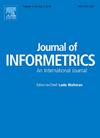出版本能:学术出版行为与“主场”研究的探索-开发框架
IF 3.5
2区 管理学
Q2 COMPUTER SCIENCE, INTERDISCIPLINARY APPLICATIONS
引用次数: 0
摘要
学术交流对科学进步至关重要,它使思想和知识得以交流。在选择出版地点时,学者们会考虑各种因素,如期刊相关性、声誉、外延、编辑标准和实践。然而,其中一些因素在不同的场所和不同的出版物中并不明显或不一致。本研究提出,学者的决策过程可以通过生物学启发的探索-开发(EE)框架进行概念化和探索,该框架假设学者在熟悉和未开发的出版场所之间取得平衡。在情感表达框架的基础上,我们引入了“家庭场所”(HVs)的基本定义,并调查了它们的出现和关键特征。HVs是一个非正式的概念,用于描述学者经常发表文章的一系列场所。我们的分析表明,大约四分之三的计算机科学学者的出版模式与EE框架的期望一致。对于这些学者来说,HVs通常在大约15-20篇论文发表后出现并稳定下来。此外,h指数越高、发表论文数量越多、学龄越高的学者,其hv期刊的排名也越高。本文章由计算机程序翻译,如有差异,请以英文原文为准。
Publishing instincts: An exploration-exploitation framework for studying academic publishing behavior and “Home Venues”
Scholarly communication is vital to scientific advancement, enabling the exchange of ideas and knowledge. When selecting publication venues, scholars consider various factors, such as journal relevance, reputation, outreach, and editorial standards and practices. However, some of these factors are inconspicuous or inconsistent across venues and individual publications. This study proposes that scholars' decision-making process can be conceptualized and explored through the biologically inspired exploration-exploitation (EE) framework, which posits that scholars balance between familiar and under-explored publication venues. Building on the EE framework, we introduce a grounded definition for “Home Venues” (HVs) – an informal concept used to describe the set of venues where a scholar consistently publishes – and investigate their emergence and key characteristics. Our analysis reveals that the publication patterns of roughly three-quarters of computer science scholars align with the expectations of the EE framework. For these scholars, HVs typically emerge and stabilize after approximately 15-20 publications. Additionally, scholars with higher h-indexes, greater number of publications, or higher academic age tend to have higher-ranking journals as their HVs.
求助全文
通过发布文献求助,成功后即可免费获取论文全文。
去求助
来源期刊

Journal of Informetrics
Social Sciences-Library and Information Sciences
CiteScore
6.40
自引率
16.20%
发文量
95
期刊介绍:
Journal of Informetrics (JOI) publishes rigorous high-quality research on quantitative aspects of information science. The main focus of the journal is on topics in bibliometrics, scientometrics, webometrics, patentometrics, altmetrics and research evaluation. Contributions studying informetric problems using methods from other quantitative fields, such as mathematics, statistics, computer science, economics and econometrics, and network science, are especially encouraged. JOI publishes both theoretical and empirical work. In general, case studies, for instance a bibliometric analysis focusing on a specific research field or a specific country, are not considered suitable for publication in JOI, unless they contain innovative methodological elements.
 求助内容:
求助内容: 应助结果提醒方式:
应助结果提醒方式:


